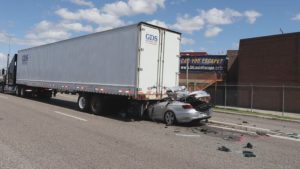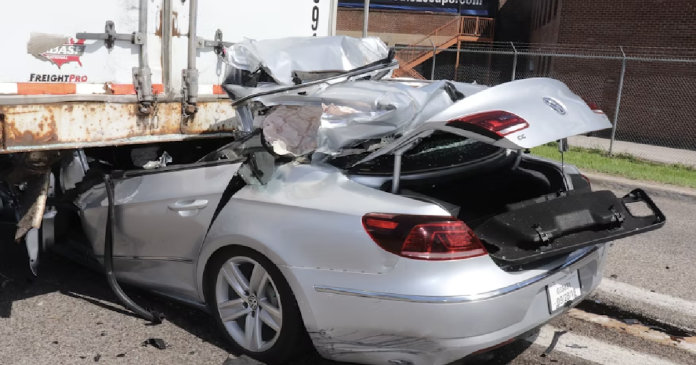Last week, a jury in St. Louis, USA, awarded a $462 million verdict against trailer manufacturer Wabash, following a fatal accident in May 2019.
In the incident, a car collided with the rear of a 2004 Wabash trailer being hauled by GDS Express, a now-defunct transportation company. The driver and passenger of the car lost their lives in the crash.
According to Wabash, the trailer met the regulatory standards in place at the time of its manufacture, 15 years prior to the accident. Evidence presented in court showed that the car was traveling at 55 mph at the time of impact—20 mph over the current National Highway Traffic Safety Administration (NHTSA) standard for rear impacts (35 mph) and 25 mph over the standard in place at the time the trailer was manufactured (30 mph).
These NHTSA standards pertain to rear underride guards, which are designed to prevent a vehicle from sliding under a trailer during a collision. Wabash emphasized that the speed of the car far exceeded what these guards are designed to withstand under safety regulations.
Despite the verdict, Wabash stated that it would explore all available legal options and emphasized that its underride guards have always met or exceeded U.S. standards. In 2018, the Insurance Institute for Highway Safety (IIHS) recognized Wabash as one of eight North American manufacturers surpassing federal standards for rear underride protection.
The attorneys representing the victims’ families argued that the rear guard detached during the impact, allowing the car to slide under the trailer and causing the occupants’ deaths. They challenged not only the design but also the structural integrity of the guard, claiming the trailer was in a defective and dangerous condition.

Wabash countered by asserting that no existing technology at the time could have prevented the crash. Furthermore, the company criticized the court’s decision to exclude evidence showing the driver had a blood alcohol level above the legal limit and that neither the driver nor the passenger were wearing seatbelts—information that might have influenced the jury’s decision.
New Rear Guard Standards Challenged for Low-Overlap Collisions
In July 2022, the NHTSA tightened its safety standards for rear underride protection between passenger vehicles and trailers or semi-trailers, adopting requirements similar to Canadian standards. These updated rules mandate that rear guards must have sufficient strength and energy absorption capacity to protect occupants of compact and subcompact cars in impacts at speeds of up to 35 mph. The improved standards aim to protect vehicles that strike the rear of a trailer with 50% to 100% of the car’s width overlapping the trailer.
However, a coalition of safety groups, including Advocates for Highway and Auto Safety and the Truck Safety Coalition, has challenged these new standards, arguing that they are inadequate and dangerous. They have urged the NHTSA to strengthen the guards for collisions involving 30% overlap. A 30% overlap is considered more dangerous because only a smaller portion of the car’s width makes contact with the trailer, concentrating the impact force on a narrower area. This increases the risk of underride, as rear guards are less effective in low-overlap situations.
In June 2023, the NHTSA denied this request, arguing that the data used to develop these rules, particularly from the Trucks Involved in Fatal Accidents (TIFA) database, were more reliable than those from its own Fatality Analysis Reporting System (FARS).
Read more :
- Urgent Risk to Trucking Industry and Working Conditions in Canada : Canada is facing growing risks of exploiting foreign workers in the trucking industry, which could have significant consequences for working conditions, road safety, and business competitiveness.
- Eight Dead and Forty Injured in a Severe Road Accident : A devastating road accident occurred early last Tuesday on Highway 40 in Florida, resulting in the deaths of eight people and injuring forty in a road collision.














